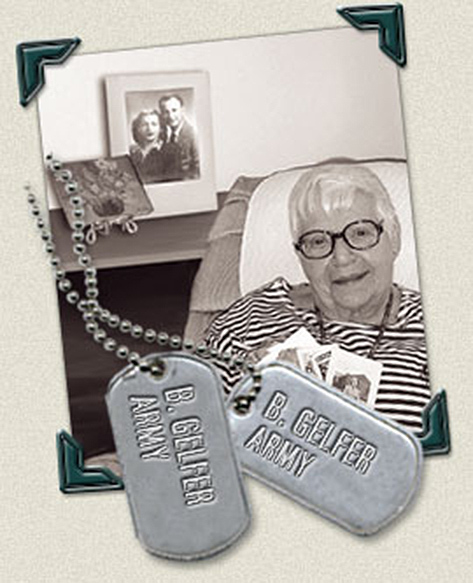
‘Growing Old is a Privilege Denied to Many,’ World War II Vet Says
By Rudi Williams - American Forces Press Service
WASHINGTON, March 7, 2001 -- “Don't regret growing old, it’s a privilege denied to many,” reads a sign on the wall of 87-year-old Bertha “Birdie” Gelfer’s small, tastefully decorated room here at the Soldiers’ and Airmen’s Home.
The sign was framed and hung for her by her late boyfriend, Frank Marcone, who died at age 79 on March 6, 2000, after a 10-month geriatric fling with the bubbly, gray-haired former Army sergeant with “10-year-old knees.” The sign adorns the walls with Gelfer¹s paintings of a Mexican wedding, flowers and a roadrunner and other paintings and ornaments.
Gelfer came here in May 18, 1999, from Lauderdale Lakes, Fla., a few months after her husband, Robert Gelfer, died from the ramifications of Alzheimer¹s disease.
“When I met Frank, I became alive again because I had somebody with whom to exchange ideas and share music and go to the wonderful sights around here,” said Gelfer, who served nearly three years as an Army stenographer during World War II. “These were the things I was unable to do for so many years because of Robert’s Alzheimer’s disease. I still love him deeply, but I couldn’t exchange anything with him except, maybe, “It’s a nice day” or “Let’s go to eat.”
“So, inside of me, I became kind of dead,” she said. “When I met Frank, I suddenly bloomed. When my kids came to visit me, they were thrilled. They said, ‘Go for it, mom.’ He really enriched my life. I became the old me. It was a wonderful experience and that helped with getting comfortable here. Frank and I had wonderful times together, but it only lasted for 10 months. Now he¹s gone, too.”
Gelfer called her life hard, but one filled with a bunch of fond memories, like her stint in the Army.
She decided to join the Army in 1943 both for the work and the adventure. She remembers dropping out of high school at 14 in 1928 after completing the ninth grade and, from there, being sent by her mother to a business school to study shorthand and typing.
“I got a job with a dentist, who also owned a newspaper,” she recalled. She said she lied about her age, adding two years and telling him she was 16.
Then bad luck started setting in. The stock market crashed in 1929 and, in 1931, the dentist sold his newspaper to a magazine businessman. “That left me jobless,” Gelfer said.
A friend helped her get a job doing fingernails in a barbershop. She later worked in a beauty shop until joining the Army in 1943.
“I always liked things military and I was getting older, wasn¹t married. My brothers and sister were gone and all the household responsibilities were on my shoulders. I said, ‘This is no life. I want to live a little,’” Gelfer said. “I had to do something for me.”
At 28, she joined the Women’s Army Auxiliary Corps. Gelfer recalled being “thrilled” when she arrived for basic training at Daytona Beach, Fla., under the backdrop of a gorgeous sunset. But the thrill waned when most of the women fell ill from shrimp they had eaten, and Gelfer spent most of the night tending to them.
“That night there was no end to food poisoning sickness and ambulances running all night long,” she said. “Fortunately, I escaped getting sick because I was too busy taking care of the sick people.”
After basic training, the Brooklynite went to an Army engineer installation, Camp Polk, La., now Fort Polk. Most of the women were sleeping when the troop train pulled into the base. When they awoke, there were little rolled up pieces of paper all over them. Men had written notes and thrown them to the women through open windows.
“‘I’m Joe, 472,’ ‘Sam, call me please, 194,’ the notes read,” she said. “We were 300 women and about 3,000 men. Need I tell you more?”
Latrine facilities were atop a steep hill, and the women ended up digging dirt stairs into the hillside to get to them. Gelfer remembered the curious wash basin they used, a funny-looking trough with faucets. It was a urinal.
She moved to her next assignment in Los Angeles, where she was given the choice of joining the new Women¹s Army Corps or be discharged. She stayed in and was promoted to corporal after three months and to sergeant in another three.
“I lived with that sergeant’s stripe for 27 months and couldn’t get a raise because the job called for a man. That’s the way it was then,” she said.
Her next job was as a stenographer in an Army Air Corps outfit at March Field in Riverside, Calif. From there, Gelfer was assigned to the 4th Air Force at Tonopah, Nev. “We lived way out in the desert,” she said. “It was sandy and difficult.”
She answered the phone one day while on duty in her company area to learn her brother had been killed. A navigator trainer stationed in Seattle, he and nine others died when their aircraft crashed into a mountain. Her brother had taken the place of a guy who'd gotten sick.
“He was 27 years old and his new wife had just gone to live with him,” Gelfer noted. “The synagogue gave him an apartment in exchange for cleaning the building. That’s where he was going to live with her, but he never came back.”
From Tonopah, Gelfer went to assignments in Santa Maria, Calif., Washington, D.C., and Fort Dix, N.J., where she was discharged and returned home to Brooklyn. She said it was raining heavily when, decked out in her Army coat, she went to her old beauty shop to get a permanent. She was drenched and her stockings were muddy. Later, she ambled into the draft board office to register her discharge. To her surprise, an old friend was there and offered her a job.
“But I wasn’t looking for a job because I gave away my civilian clothes every time I went home on furlough,” she said. “The next thing I knew, I was sitting in a big room with a judge, who was president of the East New York Savings Bank, behind a big desk.”
The judge asked, “Are you engaged, seeing any young men, getting married?” Her answer was “no” to all those questions.
“Of course, I didn’t know Robert would walk in a few months later,” Gelfer said. Though she was wet, muddy and wearing an Army coat, the judge hired her. “That was in mid-December. Robert walked in wearing his Army uniform in April to settle his mother’s estate.”
Looking on her desk and seeing a “ruptured duck,” an insignia worn above the right breast pocket on the uniform of World War II servicemen and women, Robert, a sergeant, asked, “Is that your husband’s?”
“No, it’s mine,” Gelfer answered. “He was going back to Japan to stay with a family, but once he met me, he decided not to return. We had about four dates, and his aunt gave me his mother’s engagement ring and diamond earrings.”
“How about getting married next Thursday,” he asked his willing girlfriend. Birdie said yes and began planning a honeymoon while Robert went to Fort Dix to get his Army discharge.
“We had a Jewish wedding in my living room,” Gelfer said. “We’d known each other for only 22 days. I got married at 32 and Robert was 32.”
The newlyweds moved into his mother’s empty apartment. “In those days, you couldn’t get an apartment or a telephone,” Gelfer noted. “The judge helped us get a telephone.”
The couple would raise four children in that little apartment, along with a Doberman and fishes.
“We gave the big room to the children because I had four within nine years,” she said. Robert didn’t get a well-paying job until he was hired as an estimator for a long-distance moving company. By then, though, the children were grown and had moved away.
After they retired, the couple moved to Lauderdale Lakes, Fla., and bought a condo. Robert suffered from Alzheimer's 13 of the 22 years they lived in Florida.
“We enjoyed our life until he was stricken,” she said. “His memory left him. When your partner has Alzheimer’s, you begin to lose a lot of you because you have nobody with whom to exchange ideas, things you’d always talk about or things you might notice.”
“He drove for awhile, with me navigating. Then one day, he said, ‘Why don¹t you drive?’ I had a license I’d never used. Suddenly, I became the driver at 77 years old.”
As if dealing with her husband’s Alzheimer’s wasn’t enough, Gelfer had to have both of her knees replaced. “I was ready to go home from the hospital when I caught a serious infection,” she said. “Today, I know the infection could have taken my life.” It took two months for doctors to cure her.
Gelfer said life was difficult for her having to deal with her husband’s Alzheimer’s and the death of both her sons, one at 18 from brain cancer. Then, she had to care for her father after her mother’s death.
“I wish I was 67 instead of 87 and living here,” Gelfer said. “Then I’d know I have a number of years to enjoy my life, without any pressure. This place is absolutely, unbelievably wonderful. When you live here, you’re free to come and go. Go to the gym in the middle of the day or during the night, because it’s open. You feel very safe here.”
She said she never felt safe in Florida because her neighborhood changed on her. “Here, I’m safe at any hour of the day or night,” Gelfer said. “And you have things to do -- ceramics, woodwork, lapidary -- you name it. All you have to do is to keep your room and yourself clean and follow the rules. “This is my last address,” Gelfer said emphatically.
- Log in to post comments
